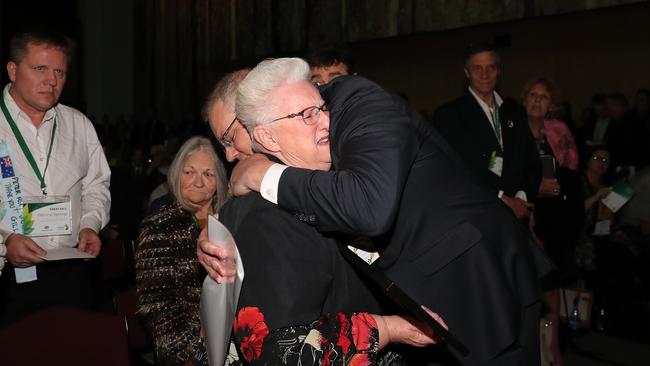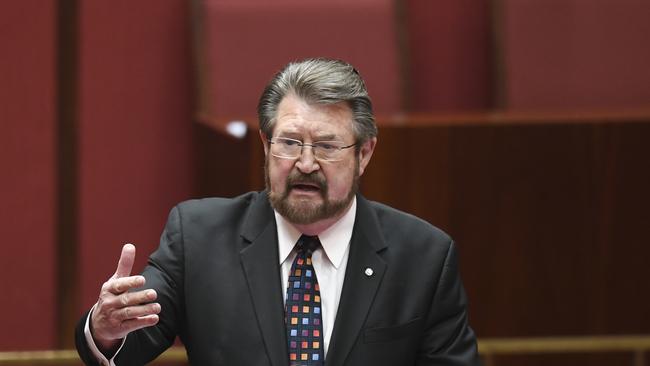The child abuse victims we’re dismissing
BY excluding prisoners from its cruelly watered-down redress scheme the government is effectively dividing child sexual abuse victims into ‘deserving” and ‘undeserving’, writes Michelle James.
Rendezview
Don't miss out on the headlines from Rendezview. Followed categories will be added to My News.
THERE is nothing more empty than an apology without change.
So at a time when Australia’s parliament has only recently paused to formally apologise to victims of institutional child sexual abuse, it is vital legislators also reflect on how to bring meaningful change to the lives of survivors.
One of the most important instruments for change to come out of the Royal Commission was the national redress scheme for abuse victims. Presently, a joint parliamentary committee — led by independent senator Derryn Hinch — is overseeing the rollout of such a scheme.
Late last week marked one year since the first redress bill was tabled. In those 12 months, the scheme has chopped and changed — overwhelmingly to the benefit of institutions — into a pale imitation of what it was once envisioned to be and a mile apart on key aspects from what the Royal Commission outlined.
Concessions for institutions have watered the scheme down, including capping the maximum amount of redress payments for victims from $200,000 to $150,000 and capping counselling services at $5000.
The bill has also limited the time survivors have to decide on a redress offer — halved from the recommended 12 months down to just six. Although this is an improvement on the federal government’s initially proposed three-month time frame, we know from our legal work in this space that victims with complex trauma often require considerable time to work through compensation offers. And for what benefit, other than to that of institutions, should they be rushed?

But not only has the royal commission’s original vision been diluted, a string of terms and conditions have been attached along the way, which the commission did not even consider. Among these are the exclusion of a number of people from the scheme entirely, including people abused in detention, non-Australian citizens and prisoners.
The Royal Commission clearly identified Australian detention facilities as places where abuse occurred and as a result, did not recommend excluding these survivors from redress. To include an addition to the legislation to exclude non-Australian citizens, which would obviously exclude the majority of detention centre participants, is a clear politicisation of the scheme. For those that do not live in Australia — but were abused in Australia — the country too has an undeniable responsibility.
We also know hundreds of prison inmates gave evidence of their abuse as children during the commission’s hearings. While it is evident that there are many complexities in compensating survivors serving lengthy custodial sentences, that should not nullify their right to eligibility of redress altogether. As our law firm, and many others have made clear, there are ways through that would ensure redress payments can still be made to these survivors, including compensation being held in trust. To cut this cohort of survivors from the scheme altogether however because it is not politically palatable to include them is callousness at its worst, showing little has been learned about the impacts of abuse on many offenders.

By excluding such large swathes of victims from redress, the federal government has in essence created a scheme focused on differing classes of survivors — namely tiers of more “deserving” or “palatable” victims. We see this as an enormous moral oversight for purely populist gain.
In its present weakened and conditional state, many professionals such as myself are increasingly finding it difficult to, in good-conscience, recommend the redress scheme to those who have suffered abuse. We are in that position because for too many people the redress scheme does not offer the access to justice survivors deserve, that was so clearly articulated by the Royal Commission.
The joint parliamentary committee, due to table its final report by the final sitting day in November 2018, now has an opportunity to fix the many issues that have arisen before it’s too late.
I implore the committee to act swiftly to ensure survivors do not continue to be substantially disadvantaged in favour of the institutions responsible for their abuse.
At a time where the country’s attention crucially and significantly turned to the lifelong impacts of such horrific abuse, we must seek change, not empty apologies.
Michelle James is the National Head of Abuse Law at Maurice Blackburn Lawyers.
Originally published as The child abuse victims we’re dismissing


